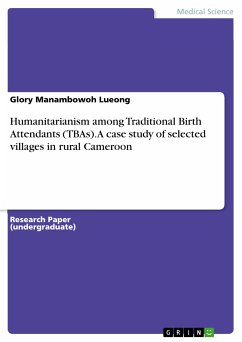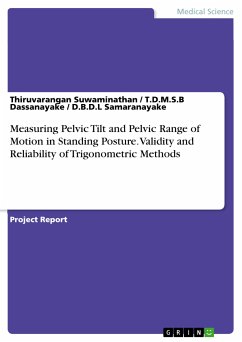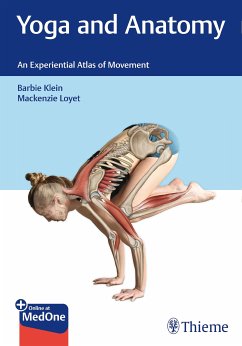
Humanitarianism among Traditional Birth Attendants (TBAs). A case study of selected villages in rural Cameroon (eBook, PDF)
Sofort per Download lieferbar
Statt: 17,95 €**
13,99 €
inkl. MwSt. und vom Verlag festgesetzt.
**Preis der gedruckten Ausgabe (Broschiertes Buch)
Alle Infos zum eBook verschenkenWeitere Ausgaben:

PAYBACK Punkte
0 °P sammeln!
Research Paper (undergraduate) from the year 2013 in the subject Medicine - Other, grade: -, , language: English, abstract: In the public health debate on how to reduce maternal deaths, Traditional Birth Attendants (TBAs) are criticised for being unable to deal with haemorrhages and obstructed labour which account for most maternal deaths. Nonetheless, in rural Cameroon, TBAs continue to practice with significantly high approval ratings of their activities by their clientele. This research used ethnographic methods to explore the following questions: what factors explain the continuous demand ...
Research Paper (undergraduate) from the year 2013 in the subject Medicine - Other, grade: -, , language: English, abstract: In the public health debate on how to reduce maternal deaths, Traditional Birth Attendants (TBAs) are criticised for being unable to deal with haemorrhages and obstructed labour which account for most maternal deaths. Nonetheless, in rural Cameroon, TBAs continue to practice with significantly high approval ratings of their activities by their clientele. This research used ethnographic methods to explore the following questions: what factors explain the continuous demand and supply of TBAs? Do pregnant women employing their services consider the 'risks' involved? How do TBAs themselves perceive their services to society? The findings suggested that; the prevalence of TBAs, use of their services, and clients' attitudes can be explained by a complex intertwined nexus of fear of HIV/AIDs stigma, gender, cultural beliefs and lack of access to formal health care systems. The TBAs interviewed considered their services as being humanitarian, but rural women interviewees had a more instrumental functional perception. These clients understood the risks involved, but considered TBAs to be relatively reliable safety nets when the formal health care system was seen as spatially or socially inaccessible.
Dieser Download kann aus rechtlichen Gründen nur mit Rechnungsadresse in A, B, BG, CY, CZ, D, DK, EW, E, FIN, F, GR, HR, H, IRL, I, LT, L, LR, M, NL, PL, P, R, S, SLO, SK ausgeliefert werden.













